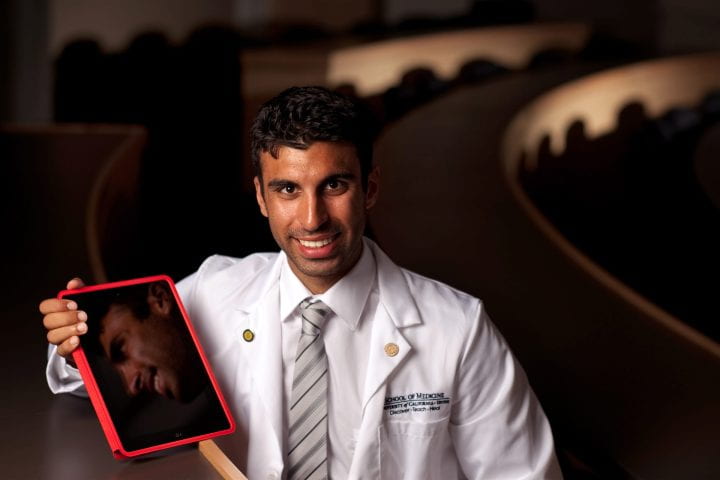A shared vision
Yale grad is pursuing his degree at UCI because of its multifaceted approach to the future of healthcare.

Nike has a motto: “Just do it.” Sam Vesuna’s guiding principle is a little different.
“You have to do it,” says the first-year UC Irvine medical student, describing how he feels when he comes across health problems he can help fix.
What makes Vesuna’s commitment distinctive is its dimension. He likes to do things big. As an undergraduate at Yale University, he founded the Yale-Ecuador HIV Clinic Initiative to provide HIV/AIDS educational and testing services to Ecuadorians in the rural Santa Elena province.
In collaboration with Manglaralto Hospital, his initiative sponsored testing for more than 2,000 patients, provided educational talks for at least 5,000 people and worked with such previously unreached populations as sex workers. In addition, Vesuna’s initiative has completed several large-scale research projects on the neglected HIV/AIDS situation in rural Ecuador.
Back on campus, Vesuna and classmate Nicole Ali McNeer invented a clot-triggered cardiac stent that can alert a patient of clot formation as it occurs, and he currently is developing a new approach to toothpaste in hopes of getting children to brush longer.
At just 22, Vesuna has also been lead author on scientific research papers about optical imaging and is working toward several publications in global health, tissue engineering and pathology — all because he saw solutions.
“If I notice a problem and can draw together components and leverage them to do some good, I have to get involved,” he says.
Vesuna is bringing this spirit to medicine, a career he’s been driven to pursue since he was a boy. Graduating cum laude from Yale in biomedical engineering afforded numerous opportunities, but he chose UCI’s School of Medicine because its vision of healthcare’s future matches his.
An important part of this is the commitment to integrating handheld technologies such as tablet computers and portable ultrasound into healthcare. The school’s iMedEd Initiative has been on the vanguard of this effort to transform medical education and clinical practice.
On Aug. 3, Vesuna and the other 103 members of the UCI medical school’s class of 2016 received their first physician’s white coats during a beginning-of-the-academic-year ceremony. Each also got an Apple iPad fully loaded with the entire first-year curriculum — textbooks, study guides, notes and podcasts. It’s the third year of UCI’s iPad program, which is fully philanthropy-supported.
Besides becoming a doctor, Vesuna sees himself continuing as an inventor, organizer and entrepreneur. He’s entering a program that lets him earn his medical degree concurrently with an MBA, which he feels is important for anyone intending to practice medicine.
“Many medical schools talk about the changing role of medicine and healthcare in America, but at UC Irvine — from the leadership to the students — there is a vision of what this change will be, and it’s in line with what I want to accomplish,” says Vesuna. “I can’t imagine a medical career without research and innovation. That’s why I’m coming to UCI.”